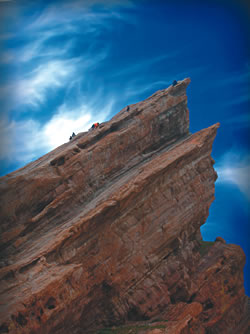BUSINESS
Inside SCV History: Vasquez Rocks
Local Natural Wonder Once Hideout for Band of Thieves
November, 2005 - Issue #13
 |
Tiburcio Vasquez was born to Spanish parents in California in the 1830s, while the land was still under Mexican control. Beginning in his late teens, he began a career of robberies and hold-ups that would span over two decades, nearly all of which was spent in Southern California. With a noted hatred for the Gold Rush and subsequent mass immigration, Vasquez's career was one of retaliation against Americans in an effort to return California to the Mexican government. Despite his career as an outlaw, Vasquez is nearly always remembered as a gentleman, incredibly respectful to local landowners and citizens under his protection. He frequented local dance halls and hotels and was said to be an excellent dancer. Outside of this elite social scene, he was a hard criminal robbing banks and stage coaches from Monterey to the Mexican Border with his gang of outlaws.
 |
Vasquez Rocks is managed by the Los Angeles County Parks and Recreation Department. For more information visit http://parks.co.la.ca.us/vasquez_narea.html. In addition to hiking and rock climbing, there are also historical exhibits on Spanish settlers and the local Tatavians Indians to peruse.
|
||||||||||||||||||||||||||||




